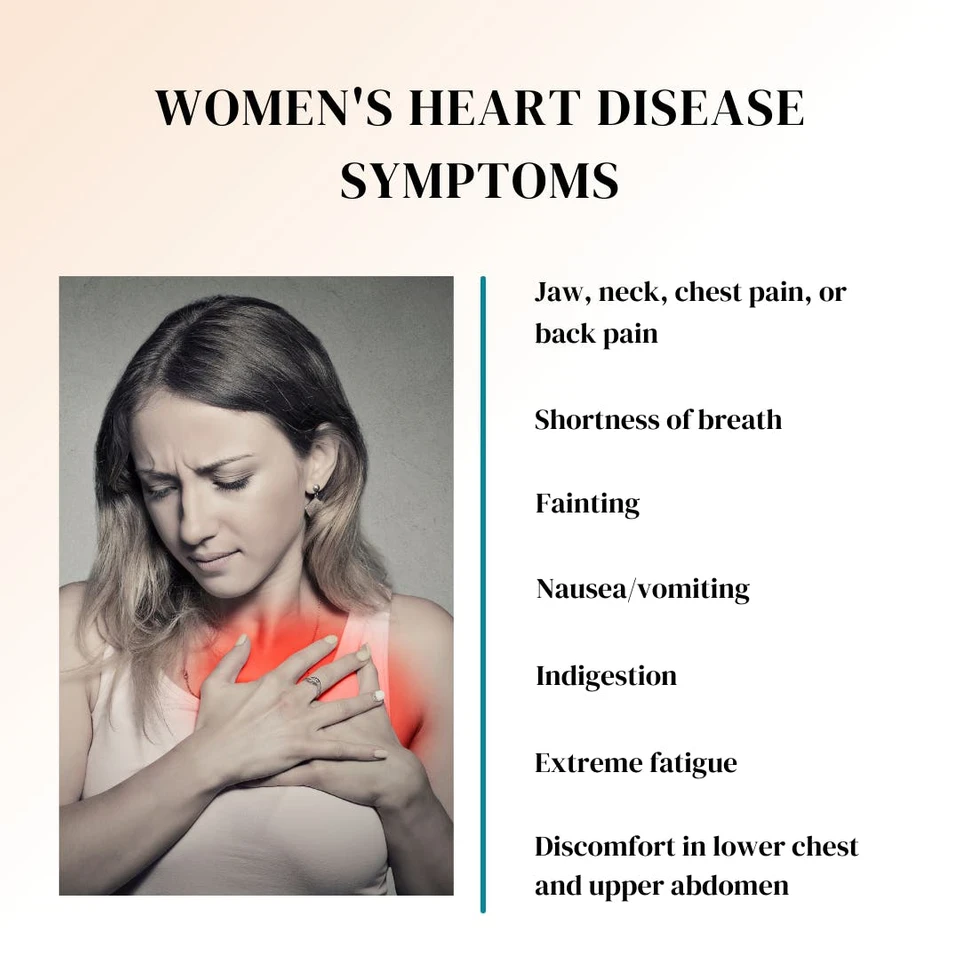Women Heart Disease Symptoms
Heart disease is a catch-all term for several heart conditions including heart attack and coronary artery disease.
Statistics On Women’s Heart Disease
In the United States, heart disease is the leading cause of death for women – far exceeding all cancers combined! Every year, heart disease is responsible for 1 in every 5 deaths in women (1).
Warning Signs Of A Heart Attack In Women
Symptoms of heart disease, particularly heart attack, can be different in women than men, and women are less likely to receive proper treatment for their heart conditions than men (2). As a result, it’s super important to be aware of the possible symptoms and risk factors. Here’s what you need to know.
A heart attack, or myocardial infarction, is a sudden loss of blood supply to the heart that can lead to death. It is usually caused by a clog in an artery that delivers blood to the heart. The main risk factors for heart attack are high blood pressure, high cholesterol, and smoking (4).
Heart Attack In Men Vs. Women
Symptoms of heart attack can be different between men and women, with women sometimes having less classic or obvious symptoms.
Women can and do have chest pain, but not always (3). Symptoms of women’s heart problems can include:
- Jaw, neck, chest or back pain
- Nausea/vomiting
- Shortness of breath
- Pain or discomfort in lower chest and upper abdomen
- Fainting
- Indigestion
- Extreme fatigue
Importantly, women sometimes experience atypical heart attack symptoms like fatigue and nausea that are not commonly recognized as concerns for a heart problem. Especially when chest pain is not always present, women may mistaken their symptoms as indigestion or a muscle ache. It is important to be aware of these unusual symptoms, especially in those who have risk factors for heart disease, in order to seek prompt medical care. Heart attacks are a life-threatening emergency where every second matters.
Heart Attack Risk Factors
Just as important as recognizing symptoms, understanding the risk factors for heart attack is crucial in order to prevent heart disease in the first place.
As mentioned, the three most common risk factors for heart attack are high blood pressure, high cholesterol, and smoking. Just under half of Americans (47%) have at least one of these three risk factors (1).
Genetics play a role as well, and many other medical conditions and lifestyle choices can put you at a higher risk for heart disease. These include
- Diabetes
- Obesity
- Unhealthy diet
- Lack of physical activity
- Too much alcohol
- Pregnancy complications
Related: Is Red Wine Good For You? A Cardiologist Explains The Link Between Red Wine And Heart Disease.
Although some factors are not within our control, there is a lot you can do to protect your heart health. Adopting healthy habits for exercising, eating right, getting high quality sleep, and avoiding smoking can significantly lower your risk of developing heart disease.
A Unique Heart Disease Risk for Women: Pregnancy Complications
Pregnancy-related complications can increase a woman’s risk for heart disease later in life.
Pregnancy in all women places excess strain on the heart. Pregnancy causes a significant rise in blood flow and therefore extra work for the heart (5). Some women also experience temporary increases in blood pressure and blood sugar levels.
Pregnancy-induced high blood pressure, known as gestational hypertension, as well as pregnancy-induced sugar problems, known as gestational diabetes, are pregnancy conditions that usually resolve soon after childbirth. However, many women do not realize that even though the symptoms have resolved, having these pregnancy complications increases the risk of heart disease, high blood pressure, and diabetes later in life (5).
In addition, preterm birth and pregnancy loss is linked to a 2-fold increase in risk of heart disease, heart attack, and high blood pressure (6).
Women who have experienced these pregnancy complications should be sure to alert their primary care doctor so they can take this into account when assessing their overall cardiovascular risk. Additionally, it becomes even more important to control all other risk factors in order to lower the risk of heart disease.
Other Unique Risk Factors in Women For Heart Disease
Aside from pregnancy related complications, women also have other unique risk factors for heart disease. Premature menopause, in which menopause occurs before the age of 40, is linked to an increased risk of high blood pressure (hypertension), diabetes, and heart disease.
Polycystic ovarian syndrome (PCOS), an endocrine disorder that can cause infertility, and many autoimmune and inflammatory conditions such as lupus and psoriasis also increase the risk for heart disease (6).
Furthermore, depression and mental health issues linked with chronic stress can affect the cardiovascular system, increasing risk of heart disease. Depression is two times more common in women than men and is a known risk factor for heart attack (6).
Women Heart Disease Symptoms: Take Home Points
- Heart disease is the leading cause of death and disability in women in the United States.
- Heart attacks in women can present differently than typical chest pain, so look out for these other symptoms.
- Some risk factors such as genetics and pregnancy complications are not within your control, but there are many heart disease risk factors that you can do something about.
Sources:
- https://www.cdc.gov/heartdisease/women.htm
- cardiosmart.org/topics/women-and-heart-disease
- https://www.goredforwomen.org/en/about-heart-disease-in-women/signs-and-symptoms-in-women
- https://www.cdc.gov/heartdisease/heart_attack.htm
- https://www.cardiosmart.org/topics/women-and-heart-disease/pregnancy-complications-may-signal-future-heart-troubles
- https://www.jacc.org/doi/full/10.1016/j.jacc.2020.03.060?_ga=2.242054082.1132143908.1626109316-1182499261.1626109316&
We discuss products we think are useful to people. If you buy something through our links, we may earn a commission. Remember to check with your personal physician to see if a product recommended is right for you.



